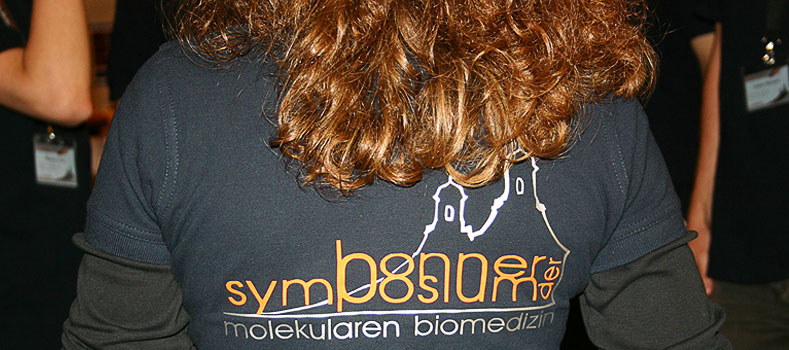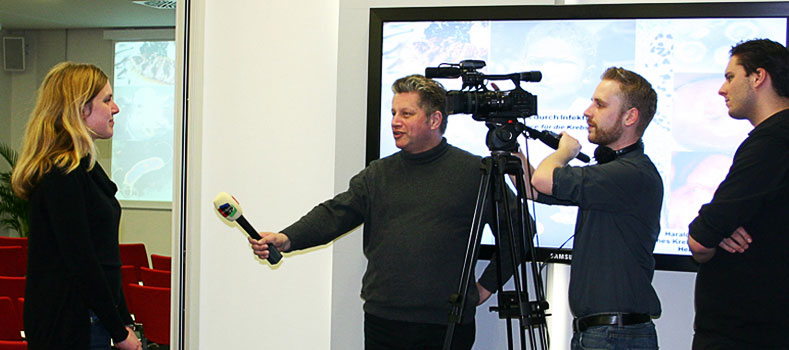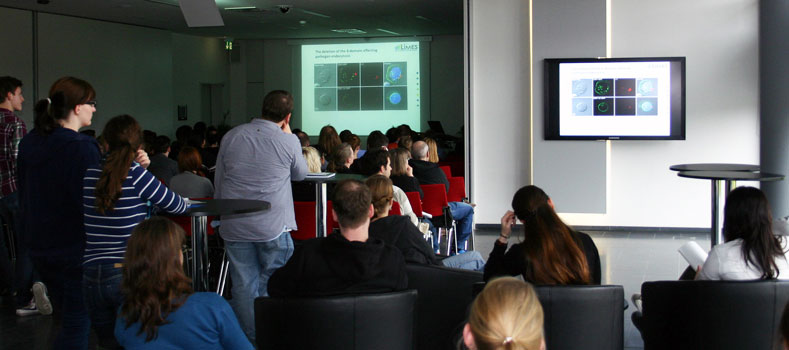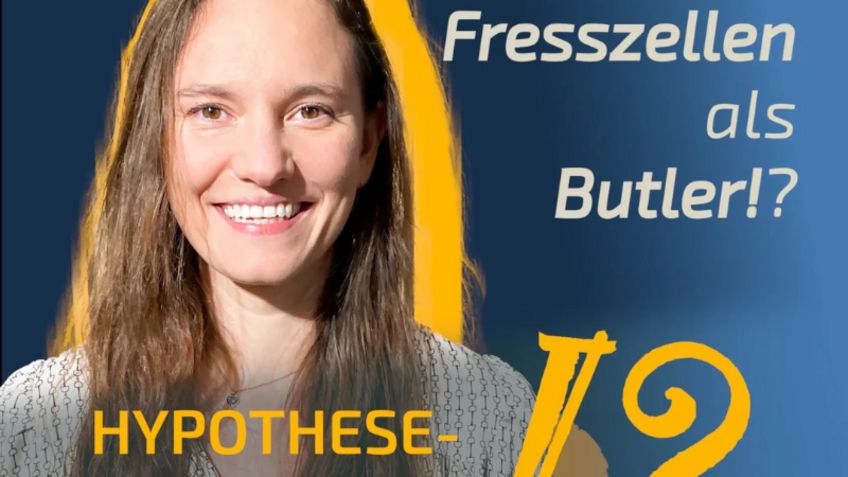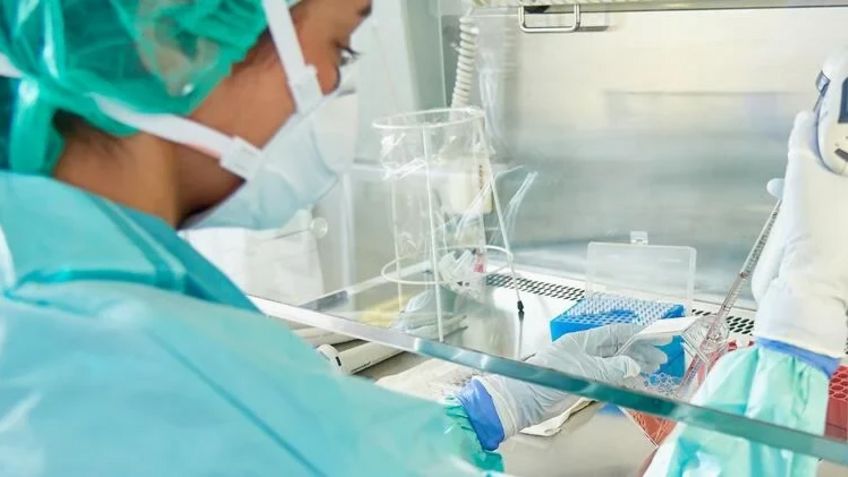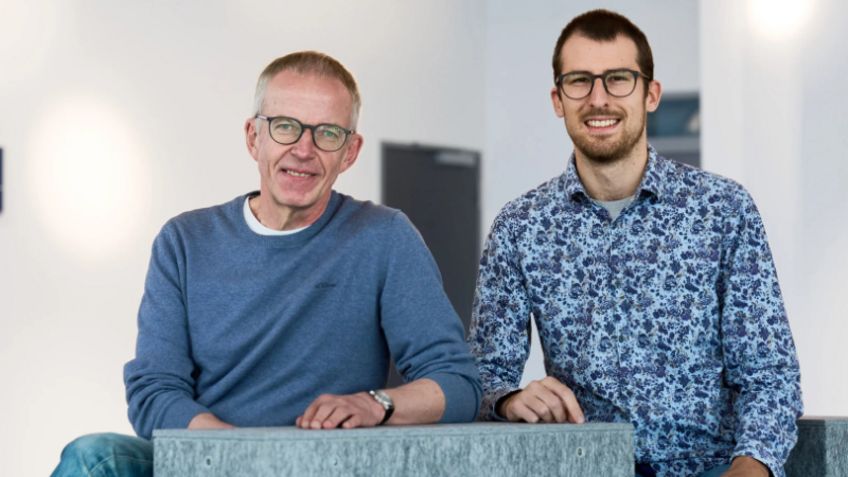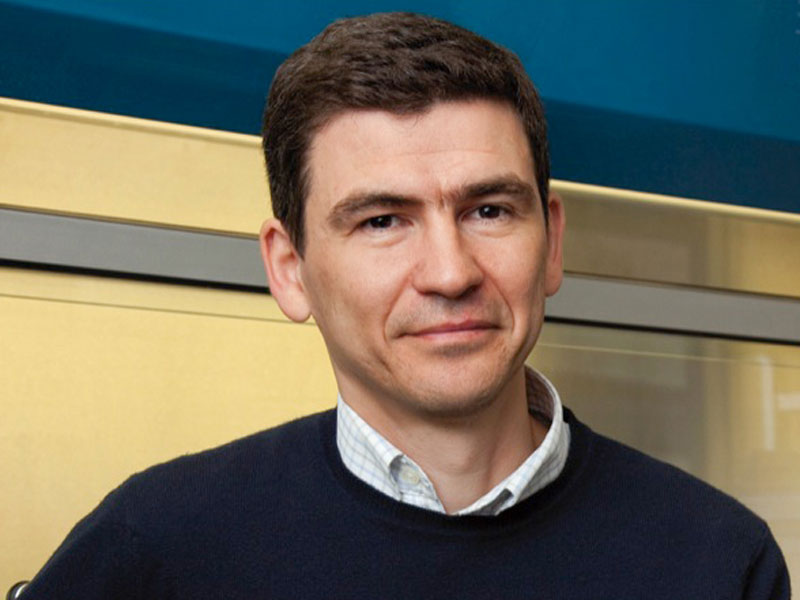
Interview with the speaker of the Women in Science (WiS) Initiative, Prof. Irmgard Förster, 22.02.2021
conducted by Prof. Eva Kiermaier
Despite the progress in gender equality during the last decade, female scientists are under-represented in research. Advances are slow and there are still gender gaps around the world. Irmgard Förster has been the first (and for many years only) female professor at the LIMES institute.
During my undergraduate studies of human biology in Marburg, we were offered to work for two years in an established immunology lab and closely collaborated with the ‘Behringwerke’ in Marburg. The company was famous for vaccine development and also had a basic research unit, in which I worked on my master thesis. We also got the chance to visit the Basel Institute for Immunology, gathering a large number of world leading experts in immunology such as Harald von Böhmer, who made a substantial contribution in deciphering T cell development in the thymus. This was a very stimulating environment and I just experienced the cloning of the T cell receptor by Susumo Tonegawa who later, in 1987, received the Nobel prize in physiology for his discovery of the genetic mechanism of antibody diversity.
There were several challenging times. Overall, I moved quite a lot and for a long time was running on a non-permanent position. My husband and I were first commuting between countries or even continents, and later between different cities in Germany. After coming back from the US, I established my independent research group in Cologne, while my husband still worked in Toronto and then started his own research group in Munich. Afterwards I was appointed as associate professor for Mucosal Immunology in Munich yet with a 6-year contract and no tenure track option.
The pressure was quite high to get a permanent position in academia during the time I was pregnant. Finally, we managed to get two positions in Düsseldorf: I was employed at a research institute outside the University as associate professor after my husband was recruited as full professor in the Medical Faculty. In 2012, I was appointed as W3 professor at the LIMES Institute and since then commute between Düsseldorf and Bonn.
I was always happy with what I am doing. Science and our jobs made me/us happy and we did not feel that commuting was a big problem as long as we didn’t have a kid. You work very hard during the week but then we used the weekends and free time to relax and enjoy ourselves. We always tried to find solutions together.
In terms of the job situation, it is very important to work actively on your carrier: writing grant proposals and trying to organize own money was essential in getting a position in Munich. Also networking with other scientists was extremely important. Later when we had a child in Düsseldorf, we took care of our son jointly and also hired a nanny (full-time) so that we could both pursue our carriers.
In general, I believe that the situation is becoming better: there are more positions available in science and the tenure track system is well established in Germany. In addition, there are various programs to support female scientists. As for science, it is extremely important to be active and look for the opportunities that are offered. It might not be the perfect position or situation right away but being patient, persistent and willing to compromise will ultimately pay off.
In terms of challenges, combining job and family is still tough. Having less time for meetings decreases the visibility of female researchers and impedes networking. Female researchers have less contact with editors, which might lead to disadvantages when it comes to publishing.
There is no ultimate and general solution available. Individual and flexible support has to be offered by the employer. In terms of childcare, we have to improve the acceptance of parental leave and family obligations. It is a shared responsibility where both women and men need to get involved equally.
I strongly believe that you have to wholeheartedly enjoy science to be successful. Your work will pay off if you like the job and if you are interested in what you are doing. It is also important to choose the right partner, who supports your ambitions. At the same time, it is important to establish a sense of achievement, which is very helpful when things to not work as smoothly as anticipated.
I have been Representative for Transfer since May 2018. My task, together with other stakeholders at the university, is to establish and set up a transfer center at our alma mater. In addition to research and teaching, transfer is increasingly being assigned to universities as a third core task. Knowledge and techno-logy transfer take place at different levels and directions, from the university to society / economy, from society / economy to the university, but also within the university. In order to make this possible, a central office is necessary that bundles activities and knowledge and coordinates it in a network.
Some of my own scientific work is very application-oriented, and I have always been committed to making economic use of the results. This work resulted in numerous patents and interactions with other working groups, but also with companies. Products and license agreements have been developed from these collaborations. After completing my doctoral thesis, I already helped to set up a biotechnology company and co-founded it. That means that I am not a stranger to both sides, the academic and the entrepreneurial, as well as the requirements for products and the associated IP questions. Together with Michael Famulok we are currently trying to found another company, Clickmer Systems, which is currently based at the Life Science Incubator (LSI) in Bonn. In addition, I provide my scientific expertise to various companies and research institutions for advice. All of these experiences, which I have had in the past years, are of great benefit to me as a transfer officer. In addition, I also learn a lot of new things from this position, get to know other areas of the university - that is exciting and broadens the horizon.
It was a collaborative effort by the Rectorate, the people who have been dealing with transfer tasks at the University of Bonn in Department 7 for many years, and many colleagues. We have started to undergo a transfer audit by the Stifterverband. This includes a self-report, i.e. a description of the status quo, and a description in which direction the transfer topic will be developed at the University of Bonn. In October 2018, a two-day audit was held, in which external experts with very different backgrounds were involved, from the academic and economic environment. All facets of the transfer were examined, with the active participation of all status groups and faculties of the University. The Rectorate and the Chancellor were also involved in this process. After these two very intensive days, the Stifterverband wrote a statement including suggestions on how to proceed. Based on these recommendations and our own ideas and framework requirements, the transfer center enaCom was founded.
This is essentially the support of all projects in the area of knowledge and technology transfer at the University of Bonn, covering all disciplines. In addition to the traditional transfer tasks, such as supporting spin-offs and start-up projects, this also includes evaluating and exploiting potential in early research phases. Patent management, licensing and the support of all status groups, i.e. professors, scientists, but also students and members of the administration and academic staff with all transfer questions and projects. In addition to classic spin-offs, this can also include the coordination of company contacts, further training concepts, but also participation in courses. Our goal is that enaCom becomes the central transfer hub of the university, which everyone is happy to contact and where, as far as we can, he or she will receive unbureaucratic support.
enaCom is located in Dezernat 7, which now operates under the name “Research and Transfer”, as an independent division 7.4 Transfer Center enaCom.
enaCom is financed from central funds, from excellence funds and third-party funding. In December 2019, we were able to raise € 1.4 million from the BMWi as part of the EXIST call ‘Potentials’. These funds are explicitly designated for increasing the university’s start-up founding activities.
We have been housed in Brühler Straße 7 since the beginning of May. Due to the Corona measures, we cannot yet get started at this location. At this location, we will also be able to offer co-working spaces for start-up teams in the early start-up phases and seminar rooms for events in addition to the office space for employees. The Science to Start-up (s2s) university group will also be on site. It will be an ‘open’ house, welcoming everyone to talk about transfer matters, on a casual basis.
At the moment, in addition to the employees Ms. Schuba and Mr. Wolf, Mr. Impekoven (Head of Dezernat 7) and I are trying to set up the division. We have just posted four positions within the EXIST program and three more for so-called innovation scouts will follow in the second half of this year. In addition, we endeavor to recruit a suitable person for leading the division. That means we are expecting an entire soccer team by next year.
Innovation scouts work decentral. This means that they will work very closely with scientists from the faculties, TRAs and clusters of excellence to discover innovations at an early stage and to develop possible exploitation strategies that will be followed up in enaCom. Of course, in close coordination with the scientists involved. As a result, we expect a significant increase in spin-offs and other uses of innovations that are being developed at the University of Bonn.
It takes a lot of time, but I have the impression that it’s worth it. We are a great team with which the work is largely non-bureaucratic and focused, and, what is particularly important to me, it is fun. Certainly, my own working group at the LIMES Institute sometimes gets a little short, but thanks to electronic tools, even before corona times, all of this is manageable. I hope that we can actually do valuable work for the entire University and build a powerful transfer center. The project is backed by the Rectorate and the odds are good that we will be able to achieve our goals in the next years.
After my extremely diverse training as developmental biologist – I went from working in tracheal development in Drosophila to heart development and ER stress in mouse – I had the feeling that I needed a new challenge. The last few months of my PhD research as well as the work that was being done at LIMES led me into the field of immunology. After some research, I soon realized that this scientific area offers a lot of potential. My new topic should be immunology, preferably something where I could apply my previous knowledge - but where should I go?
Joachim Schultze gave me a list of laboratories that were a good match, both in terms of topic and location, and I decided to join Frederic Geissmann’s laboratory. Frederic was already well known at the time, and had published a paper in 2012, which should completely change the field of macrophage biology. Shortly after my arrival in London, another paper came out showing that early embryonic precursors in the yolk sac can differentiate to resident macrophages, which are still present in the adult animal. The fact that macrophages develop completely independently from the bone marrow was very controversial at the time, since the research of many laboratories depended on differentiating macrophages from the bone marrow or from blood monocytes.
However, many groups have since published similar findings and it is now widely accepted that most tissue-specific macrophages are of embryonic origin. These findings have wide-reaching implications not only for the homeostatic functions of macrophages during development, but also for the (active) role of macrophages in the development of diseases.
In my first project I was able to show that the differentiation process of macrophages is an integral part of organogenesis as the specification of macrophages happens very early in the organs. Building on this knowledge, I have generated a mouse model for a human disease (known as histiocytosis) in which microglia, the macrophages in the brain, are mutated early during thereby causing a neurodegenerative disease.
In my lab at LIMES, I would like to further explore the differentiation processes and homeostatic functions of tissue macrophages and thus provide a basis for studying and understanding the pathophysiology of diseases.
In general, I like the flexibility. There is always something new to discover and you can switch or expand your topic depending on new findings. Moreover, you are very flexible in terms of work hours. The special thing about my scientific field is the interdisciplinarity between developmental biology and immunology. New technologies like single-cell sequencing or barcoding give me the opportunity explore new areas.
I am actively developing my own scientific network, now also in Germany and Europe. Since I have not that long been in the field of immunology, I still have a lot of catching up to do. Nowadays nothing works without networking. You can see this in my publications: there are always teams from the US and Europe included. It takes too much time to set up new methods yourself, as they become more and more complex. Thus, one is well advised to get an expert in this field to the side.
The Tokyo-Bonn connection has always been extremely fruitful. This international exchange not only brought us together scientifically, but also culturally. Japanese are very different from us Europeans, and eating sushi, singing karaoke or playing one of their many drinking games together has always been an adventure. We even learned a traditional fisherman dance once. I can only recommend to everyone to participate in this cooperation!
As a tip, I can say that you must go through life confident and should not be afraid to ask yourself what you want. Networking is also very important, especially among women. These tend to stand in each other’s way because they see competitors in other women.
Yes, a woman definitely has a harder time than a man. Often, she is scientifically underestimated, reduced to having children or being a mother, and must have published twice as many papers or raised grants for the same job. I have heard many times that the men of my generation see themselves as victims of female quotas. I do not feel that way, because I personally would hire the better man instead of the ‘quota woman’. But this discussion would probably fill pages ...
Lots of exercise and sports. But for the absolute shutdown of the professional and the private I play chess. This gives the head no time to deal with the everyday things.
After some time abroad you have returned to the LIMES institute. Do you feel a bit like coming home?
Yes, iI feel a little at home here. I was also warmly received and supported from all sides. As someone who hates big cities neither London nor New York were the best destinations for me; that’s why I generally feel very comfortable in Bonn as a city.
My postdoc life was mostly work, but only because it was my personal choice. I love my job and I did not mind working late in the evening and weekends. Nevertheless, I also visited the many museums, operas and musicals in London and New York! The advantage of doing your postdoc in such cities is that all friends and relatives want to come to see you there, so I did not have to fly to Europe often.
I am an internist and infectious diseases specialist. I was born and did my medical studies in Cluj-Napoca, Romania. After finishing the medical studies in 1993, I moved to Radboud University Nijmegen for the PhD and clinical specialization with the group of Prof. Dr. Jos van der Meer. After another year as a post-doc at the University of Colorado, Denver, in the lab of Prof. Charles Dinarello, I moved back to Nijmegen, where I work as a Professor of Experimental Medicine since 2008.
My key interest is to understand the regulation of innate immune responses during severe infections, such as disseminated fungal infections or sepsis. In addition, our group works on the adaptation of innate immunity after infection or vaccination: this is a de facto innate immune memory that we recently termed trained immunity. The reason for this interest is my firm belief that innate immune mechanisms are some of the most important components of host defense, and at the same time some of the least approached from a therapeutic point of view.
Most of my exposure is with science environments in the Netherlands and United States. Of course the major ways of approaching research are very similar. However, there is a much more collaborative sphere in the Netherlands compared with United States, where people and labs are much more competitive with each other. Romania is at this moment at the very beginning of building a research culture, but this has started to change fast in the last couple of years.
I have had a very fruitful collaboration with researchers at LIMES for several years already. It was very stimulating to perform these collaborative projects together, and we have observed how nice our expertise is complementary. It was thus an organic process in which we thought to improve this collaboration even further by joining the LIMES.
Be enthusiastic about what you are doing and work together with others. Never be afraid to collaborate: the vast majority of colleagues are nice, they want to help and will teach you a lot. And in the end it is much more fun to work together with many people.
It is in fact pretty easy, because Nijmegen and Bonn are in fact close. I already arranged dates when I will be in Bonn to discuss with the colleagues, to organize the lab and supervise the work.
I love to hike in the mountains and I love to read science-fiction. I actually even wrote a science fiction novel myself: North-West Passage to the Moon.
I was born in Seoul, South Korea. My mother and I immigrated to the United States when I was nine, where she remarried an American who happened to be of German heritage (which explains my distinctly Un-Korean last name). I came to Germany to do a post-doc with Herbert Jäckle when he was a young group leader in Tübingen.
Over 25 years. I actually had no intention of staying so long. I had a very unsuccessful PhD period, so I thought my only chance afterwards would be to take little steps. Plus, I always wanted the experience of living in Europe. So the plan was to do a short post-doc in Germany in a relatively small but promising lab, and then do a second “real” post-doc back in the US. Then Herbert’s lab took off like a rocket and my own project started working out unexpectedly well, so I decided to stay longer. Oh yeah, there was one other factor - a blonde Swabian girl joined the lab few months after I got there...
I was interested in the natural sciences ever since I was a child. But I got hooked on biology in the 9th grade after reading a book on the discovery of the Rous Sarcoma Virus, which causes tumor in chickens (Peyton Rous received the Nobel Prize for this work). I became so fascinated that I bought little chicks (kept them in our basement), and ordered the virus from the American Type Culture Collection (with my father’s checkbook after forging his signature). When I told a researcher at a local university about it, he completely freaked out and told me to hand over the as-yet unopened vial of the virus immediately.
My parents gave them away to a local farm.
No. I know it sounds clichéd, but it’s a privilege to make a living doing what you really love doing. Having said that, I had a chance before going to grad school to work on a major new edition of James Joyce’s Ulysses. My English professor at the time asked me whether I would be interested in participating, and funny enough, it was being spearheaded by a German professor in Munich. I was very tempted but in the end decided not to. Several years later, I came across the finished edition at a bookstore and I have to say, there was a pang of regret for not having taken that unique chance. So that’s one “career-like” decision I would take back. But choosing a different career? No, I’m having too much fun right now.
This is a toughie. Because doing research is full of uncertainties, it’s difficult to stay with it for the long haul if you don’t have a passion for it. It also of course depends on the metric by which you define “success”. But for grad students or post-docs, I would emphasize two ingredients. One is the ability to focus on getting your next experiment to work. I don’t mean getting some preconceived hoped-for positive results, but just getting the experiments done in a rigorous way. The other is talking to people whose experiments are working better than yours.
I guess a difficult issue is trying to find where the fulcrum is at different stages of your career. I don’t think I could’ve done such a commute 15 years ago. But an important general lesson for me has been to keep plugging away at one side even when the other side is not going well. If your paper gets rejected, or your experiments fail for the umpteenth time, or there is a lab conflict, you have to go home and still try to do the normal things; and if things are not going well at home or outside the lab, you still have to show up and try to get the experiments done.
Connectomics for one. Trying to map out the complete synaptic connections of a brain. We’re part of a major international effort to map the fly larval brain. This can be seen as being part of a broader global effort to map the human brain. Another one emerged as part of our participation in the Cluster of Excellence and concerns how the immune system alters brain function and animal behavior. I’ve always thought that the brain had to solve two major problems, food and sex. But now I realize that it has to solve a third - not getting killed while trying to solve the first two.
You could start by listing the devastating diseases of the nervous system that could be alleviated by having a better understanding of brain structure and function - Alzheimer’s, Parkinson’s, ALS, the complex psychiatric disorders. You can also see this as an amazing endeavor to understand how organized groups of cells enable us to perceive the world, show emotion, have thoughts, remember and act. Some people have compared the sequencing of the human genome to the moon landing. I was never a fan of this analogy, not for scientific reasons but humanistic. Whereas genome organization is a modern concept, the moon has been something mythical, something unreachable since ancient times. Like the mysteries of human mind and behavior. So I think the brain project is a closer fit to the moon landing project.
Somewhat by chance. When we initiated our study of how brain controls feeding behavior in Drosophila many, many years ago, we first isolated mutants that couldn’t feed properly. But we quickly realized that we didn’t have the tools at the time to figure out what was going on in their brains. So a former graduate student in the lab, Ingo Zinke, decided to see if they had defects in nutritionally-regulated genes. And that turned into a whole little world of its own. We were in fact the first European lab to use Drosophila Affymetrix chips, if anybody remembers that dinosaur technology.
Eggs, good or bad?... I have a June 2014 issue of TIME magazine whose cover story reads “Eat Butter. Scientists labeled fat the enemy. Why they were wrong.” This reminded me of a front page New York Times story back in 2002 titled “What if It’s All Been a Big Fat Lie?”, which describes the flimsy scientific evidence certain key go-vernment dietary recommendations were based on. Then there’s the famous “Food Pyramid”, being taught at public schools all over the country, the problem being that it’s not clear now what foods should occupy what level of the pyramid.
My feeling is that much of the recommendations to the public are based on bad or inadequate data. One could cite any number of “scientific studies” to support any agenda you want. For drugs, the target audience is relatively much smaller, i.e. those who have a certain condition, but nutrition affects everybody. That’s why it’s important for good scientists to become engaged in nutrition research and public policy. It’s an extraordinarily important area that affects society at all levels: financial, health, educational, scientific.
Despite the vast amount of writings and discussions out there, it’s amazing how little we know about how different combinations and concentrations of things we eat affect our body. A clarification is nowhere in sight. Now add the globalization factor - in most Asian countries, you basically eat the same thing for breakfast, lunch and dinner; in most Western countries, you usually eat different things. What’s better? Don’t have a clue. So my advice - do what my mother always tells me, eat a balanced meal.






